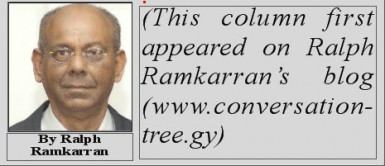Mr Anil Nandlall, former attorney general and PPP/C Member of the Parliament, and now the guardian of our rights under the constitution, pronounced ominously on the dire consequences that would befall the nation if the Prime Minister sets foot in the Parliament Chamber, after he is sworn in to perform the duties of the President. He warned: “If he goes back into the Chamber then the entire business of the Parliament will be tainted by an unconstitutionality and that means that the entire proceedings we are embarking upon will be unlawful, illegal, unconstitutional, null, void, and of no legal effect.”
The Prime Minister responded in support of his right to sit in Parliament. He argued: “I can only tell you that I am performing the functions of the President; but I am the Prime Minister, an elected Member of Parliament, and I am the Leader of Government Business in the House.” However, he did not return to Parliament.
It is to be noted that the Prime Minister said that he was “performing the functions of the President” while Mr Nandlall referred to him as “acting as President,” as the press frequently does.
 Article 89 of the constitution states that “there shall be a President of the Co-operative Republic of Guyana, who shall be Head of State, the supreme executive authority, and Commander in Chief of the armed forces of the Republic.” The President retains his post until another President is elected. Thus Article 92 states: “A person assuming the office of President…shall…continue in office until the person elected to the office of President at the next election held under article 91 assumes office.” By Article 178 the President would also lose his or her office if he or she dies, resigns or is impeached.
Article 89 of the constitution states that “there shall be a President of the Co-operative Republic of Guyana, who shall be Head of State, the supreme executive authority, and Commander in Chief of the armed forces of the Republic.” The President retains his post until another President is elected. Thus Article 92 states: “A person assuming the office of President…shall…continue in office until the person elected to the office of President at the next election held under article 91 assumes office.” By Article 178 the President would also lose his or her office if he or she dies, resigns or is impeached.
The President may not always be in a position to perform his or her functions such as when he or she is absent from Guyana. In such a case article 96 (1) gives the President the power to authorize any elected member of the cabinet to perform such functions of the office of President as he or she may specify. The person who is usually appointed is the Prime Minister unless he or she is not available in which case another cabinet member is appointed.
The President may be incapable of discharging the functions of his or her office and may be unable to authorize another person by reason of physical or mental infirmity. Even in such a case the President does not lose his or her office, even temporarily. The Prime Minister merely performs the President’s functions. If there is no Prime Minister then the functions would be performed by an elected member of the cabinet elected by the cabinet and, if there is no prime minister and no cabinet, then by the chancellor (Article 96 (2)). The procedure is provided for by Article 179.
There is nothing in the constitution that says, implies, or can be construed as suggesting that the President would temporarily lose or be temporarily deprived of his or her post for any reason. It is only in such a case, if it were possible, would it have been necessary to have a provision for an “acting President.” That there is no such provision in the constitution confirms that a temporary loss of office by the president was never contemplated by the framers. If the president loses his or her post prematurely under Article 178, the prime minister does not perform the functions of the president but succeeds to the office as president. He or she becomes the president.There is nothing in the constitution to suggest that a prime minister loses his or her position as prime minister or member of parliament while performing the functions of president. Since the holder of a constitutional office such as the prime minister, cannot be deprived of it unless the constitution explicitly provides for it, the prime minister continues to hold his or her office while performing the functions of president. The prime minister is, therefore, entitled at all times, even when performing the functions of president, to sit and vote in Parliament.
When Prime Minister Sam Hinds performed the functions of President, he voluntarily stayed away from Parliament. The issue never arose in the National Assembly for a ruling during his tenure. Up to 2011 the government had a majority of several seats so that the government was never in jeopardy of losing a vote. Now, however, the government has a one-seat majority and the vote of the Prime Minister is important to it. Since it is clear that Prime Minister Moses Nagamootoo can attend Parliament, even when he is performing the functions of the President, the government’s one-seat majority would be protected.
There was reference in the press to the fact that there is a convention that the prime minister does not sit in Parliament when performing the functions of president. It is not a convention. It is a practice. For a practice to evolve into a convention holding the force of law, the practice must have historical provenance that must not violate any law or the constitution, as it does in this case.



